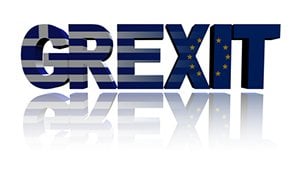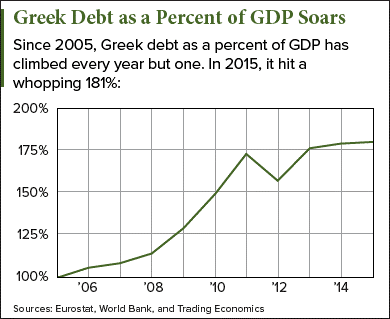Poor, beleaguered Greece hopes to get its next €7.1 billion ($7.5 billion) bailout payment in June, just in time to make roughly €6 billion ($6.5 billion) in payments to creditors in July.
Now, tense negotiations in Valetta, Malta, last month appeared to smooth some stumbling blocks to releasing the latest tranche of the €86 billion ($92 billion) "rescue package," but this deal is not a done deal.
Then again, it's likely Greece will get its next handout... but there's a better than even chance it might be its last.
And that should have investors all over the world, even in booming America, concerned.
You need to know what could happen...
We've Got to Talk Honestly
 The "diplomat-ese" coming out of Valetta, spouted for the benefit of mass media consumption, contains all sorts of pleasant, encouraging words, like "breakthrough" and "agreement."
The "diplomat-ese" coming out of Valetta, spouted for the benefit of mass media consumption, contains all sorts of pleasant, encouraging words, like "breakthrough" and "agreement."
Unfortunately, it's mostly bull. And the public doesn't know it.
There are some serious questions investors need to have answered - and answered frankly - so they can be properly informed.
Questions such as...
Who's really propping up Greece, and why are they doing it?
What happens to the markets if Greece defaults, or, much worse, repudiates its debts?
These are just the biggies. Let me show you what's going on...
How Everyone Got Dragged into This Mess
Since, as always, we're being honest here: Greece lied and cheated its way into the European Union. They had a lot of help from Goldman Sachs.
Under the Maastricht Treaty, the rules that govern the European Union and created the euro, a country that wanted into the Union and the common currency had to have "sound fiscal policies," including debt limited to 60% of GDP and annual deficits not greater than 3% of GDP.
Goldman Sachs created a series of massive currency swaps that essentially masked Greece's true economic condition by burying, temporarily, the extent of Greece's budget deficit.
Whether it was a game that economically strong EU countries knew was being played has never been openly questioned. However, in all likelihood, it was no secret.
The euro was initially a boon to all countries that adopted it, but lately, it's tough to escape the fact that it's serving some countries better than others lately.
Nowhere is that better illustrated than in Greece - the posterchild example of what went right then so terribly wrong, and Germany, where it all went right.
Germany is essentially the backbone of the Union - and the euro. And of course it was a powerhouse even before the EU formally came into being.
But Germany had a growing problem, precisely because it was an economic and export juggernaut with a strong currency, the old deutschmark.
Countries across Europe, especially the so-called "Southern Tier" of Portugal, Spain, Italy, and Greece, who weren't doing as well economically as Germany, had currencies that reflected their tougher economic conditions.
Since their individual escudos, pesetas, lire, and drachmas were weak relative to Germany's deutschemark, Germany's exports were increasingly expensive to buy with their weaker currencies.
 A Union with a common currency would eliminate cross-currency differences and make Germany's exports to the rest of the Eurozone appear to be cheaper - or at least not an obstacle in terms of currency differentials.
A Union with a common currency would eliminate cross-currency differences and make Germany's exports to the rest of the Eurozone appear to be cheaper - or at least not an obstacle in terms of currency differentials.
And since it was easier to borrow in a common currency, interest rates came down and euro loans became readily available in quantity across the continent.
Greece borrowed and spent while Germany exported more and more.
Then of course came the financial crisis of 2008 and the global Great Recession that followed. Southern European countries that had converted to the euro and borrowed heavily were leveraged close to insolvency and had to be bailed out.
The backing for all those bailouts came from none other than the European Central Bank (ECB), the Union's collective central bank.
And we all know how helpful and honest and altruistic central banks are...
In Reality, the ECB Is a Fantasy (and a Scam)
[mmpazkzone name="end-story-hostage" network="9794" site="307044" id="138536" type="4"]
The ECB, like our own central bank, the U.S. Federal Reserve System, doesn't actually have capital like, you know, a real bank.
Central banks are "fiat" banks; they're banks because they call themselves banks (or, in our case, a "system"). People believe they have unlimited "capital," and central bankers do nothing to disabuse them of the idea.
The only capital they really have is (misplaced, unearned) trust, because everyone who trusts the world's banking system buys in - literally - to the fantasy that these central banks have unlimited capital.
In reality, the ECB has a tiny amount of capital, contributed by some of the countries in the EU. Not that it's important, because the fantasy is such a given, but several of the countries who pledged capital to the ECB never bothered to actually fork it over.
So in order to pull off Greece's third bailout, the ECB has had to supply money (which it doesn't have) to badly damaged, extremely shaky European banks, so that they may buy the debt Greece issues to keep paying off previous bailout loans it's been racking up.
Without the ECB promising to guarantee Greece's debt and lend money to the banks that are buying Greece's bonds, there wouldn't have been any bailout of Greece, and it would have stopped paying its debts.
You can see how that's problematic, but we're only scratching the surface here.
The truly monumental, world-smashing problem comes if Greece can't pay. Or, much worse, it could repudiate the debt - just boycott it and say it will never pay.
In that nightmare case, all the banks that borrowed from the ECB, and who are backstopped by the same fantasy factory, would have to declare those loans nonperforming or in default and write them off.
If they have to do that, the hit to their capital, their wafer-thin equity, the short-term money they borrow to make loans, and not to mention their depositors' money, would render them insolvent.
And there would be no one to bail them out.
There's a Chance This Charade Will Fall Apart
That's why Germany and the ECB are so hell-bent on this "extend and pretend" scheme writ large.
You see, so long as the EU, in particular the Eurozone, hangs together, the fantasy that the ECB is backstopped by the taxing power of its members can be perpetuated; the game can go on.
But if France leaves, or if the Netherlands leaves, if other countries make to leave or even threaten to leave, the whole fantasy factory evaporates, and the bottom drops out of the markets.
In fact, there won't be a market in the world that won't crash.
For now, it looks like Greece will do what it's being asked to do by the IMF and European backstopping powers (Germany) - including painful pension benefit cuts, labor market reforms, and tax base expansion.
So, Greece is probably going to get the June tranche it's waiting for to pay its July bills coming due.
But... there are lots of negotiations ongoing to get Greece from there to here. What's more, there are hotly contested elections in France starting this weekend, and equally momentous balloting in Germany itself in the fall. If those elections overturn the status quo - something that's been happening a lot lately... look out below.
If that happens, I'll be issuing recommendations to add plenty of short euro and financial exposure to my Short-Side Fortunes and Capital Wave Forecast portfolios. A way for Money Morning Members to play this would be ETFs, like the Direxion Daily European Financials Bear 1x Shares ETF (NYSE Arca: EUFS) and the ProShares Ultrashort Euro ETF (NYSE Arca: EUO), that pay off when the euro and euro-financials start to slide. And slide they likely will.
You've been warned, you've got the truth on your side, so now you can prepare.
Twice each week, Shah talks about the profit opportunities he sees rising from Wall Street and central banks' economic monkeyshines. Click here to get his Insights & Indictments delivered right to your inbox, absolutely free.
Follow Shah on Facebook and Twitter.
About the Author
Shah Gilani boasts a financial pedigree unlike any other. He ran his first hedge fund in 1982 from his seat on the floor of the Chicago Board of Options Exchange. When options on the Standard & Poor's 100 began trading on March 11, 1983, Shah worked in "the pit" as a market maker.
The work he did laid the foundation for what would later become the VIX - to this day one of the most widely used indicators worldwide. After leaving Chicago to run the futures and options division of the British banking giant Lloyd's TSB, Shah moved up to Roosevelt & Cross Inc., an old-line New York boutique firm. There he originated and ran a packaged fixed-income trading desk, and established that company's "listed" and OTC trading desks.
Shah founded a second hedge fund in 1999, which he ran until 2003.
Shah's vast network of contacts includes the biggest players on Wall Street and in international finance. These contacts give him the real story - when others only get what the investment banks want them to see.
Today, as editor of Hyperdrive Portfolio, Shah presents his legion of subscribers with massive profit opportunities that result from paradigm shifts in the way we work, play, and live.
Shah is a frequent guest on CNBC, Forbes, and MarketWatch, and you can catch him every week on Fox Business's Varney & Co.



